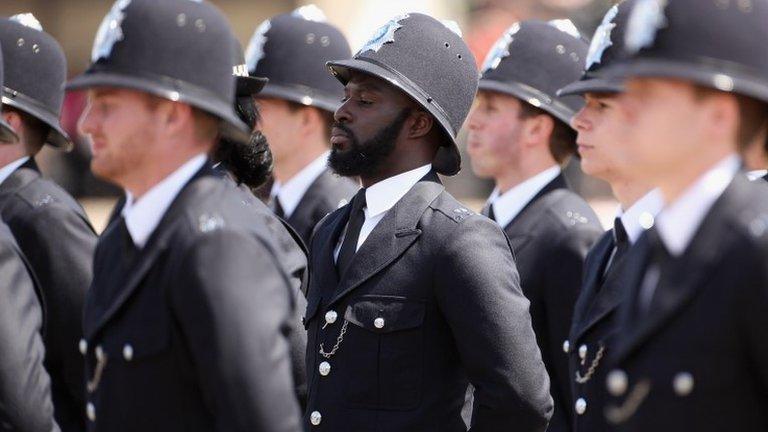Police not recording a fifth of crimes, watchdog report suggests
- Published
- comments
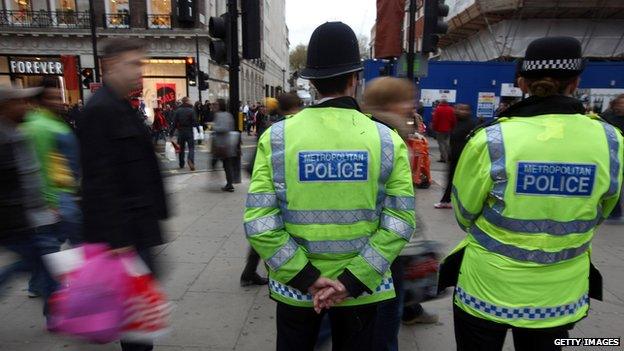
Thirteen police forces have been inspected so far
A fifth of crimes in England and Wales could be going unrecorded by police, according to a report.
Her Majesty's Inspectorate of Constabulary (HMIC) said 14 alleged rapes were among the offences that had not been recorded by officers.
One report of rape was not recorded because of "workload pressure", the inspection of 13 forces found.
Home Secretary Theresa May said the report exposed "unacceptable failings" by the police.
HMIC - which inspects and monitors the 43 police forces in England and Wales - is conducting an inspection into the recording of crime data, external.
Tom Winsor, HMIC: "Justice denied" by unreported crimes
If its initial findings were repeated across England and Wales, it could mean 20% of all crimes were going unrecorded, it said.
Mrs May said it was "quite possible" the HMIC study could lead to an increase in recorded crime.
The Association of Chief Police Officers (Acpo) said the report highlighted both "strengths and weakness" in the forces inspected.
'Unethical behaviour'
An unrecorded crime is classed as one that is reported to the police, but not recorded as an offence.
The failure rate among the forces so far inspected was too high, HMIC found.
"We believe that it is weak or absent management, poor knowledge on the part of those making the crime recording decisions with the crime recording rules, weak or absent training or workload pressures," said Chief Inspector of Constabulary Tom Winsor.
"But because the failure rate is as high as it is... it is impossible to rule out discreditable or unethical behaviour."
The BBC's home editor Mark Easton said crime levels were decreasing.
He said: "There is a great temptation to suggest the police recording of crime reports issue is evidence that stats on crime trends cannot be trusted, fuelling suggestions that crime is rising while politicians say it is falling.
"Crime is falling - fast. It has been for 20 years. Police records have always been a poor measure of crime trends, partly for the reasons identified by the HMIC.
"People should not think their risk of being a crime victim is rising. It is at an historically low level."
Inspectors listened to original calls from the public and the resulting incident reports to check whether or not crimes had been recorded correctly.
Out of a sample of 3,102 incidents across 13 forces audited so far, HMIC found 2,551 crimes should have been recorded but 523 were not. This included reported sexual offences, violent crimes, robbery and burglary.
Describing "workload pressure" being cited as the basis for not recording a report of rape, the report said: "In this example, it was considered that recording the crime would entail too much work, as the officer made a judgment that the circumstances of the complaint made it unlikely that the case would be prosecuted."
The watchdog also found some offenders were being wrongly given out-of-court disposals, including cautions and fixed-penalty notices. In one in 10 cases, the measure could not be justified because of the individual's offending history, it said.
Adam Pemberton, of the Victim Support charity, said unrecorded crimes were "completely unacceptable".
"This is about much more than inaccurate statistics or poor number-crunching - each mistake represents a victim losing their chance to get justice and to access support services."
'Desire to protect'
Mrs May said: "HMIC's interim report exposes unacceptable failings by the police.
"It is quite possible, once HMIC has completed its work on recorded crime statistics and made recommendations on how the police need to improve, that we will see an increase in recorded crime.
"If that increase is driven by improved accuracy in the recording of crime or more victims reporting crime to the police, we should welcome it. Such an increase would not mean that crime itself is rising."
Shadow home secretary Yvette Cooper said: "Though only an interim report, the inspectorate's findings are extremely serious."
Chief Constable Jeff Farrar, Acpo's national police lead for crime statistics, said: "There's more to do to raise standards and get consistency across the country but it's important to recognise that in many of the cases identified by HMIC as failing to comply with the Home Office counting rules there's clear evidence that the public have still received an appropriate and responsive service.
"While the report identifies that the Home Office counting rules are not especially complicated, they can be interpreted by forces in different ways. We are working hard to rectify this through training and accreditation of force crime registrars led by the College of Policing.
"The vast majority of officers join the police motivated by a desire to protect the public; nobody joins the police service with the intention of recording crime inaccurately. However, it is clear that the service has not always met the standards of data quality that the public expects."
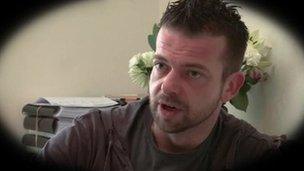
Met Police whistleblower James Patrick feels "vindicated"
Met officer James Patrick said he was forced to resign from the force after raising concerns similar to those in the report.
"I started discussing this on a blog way back in 2012 and I feel like telling the truth has resulted in a negative impact," he told BBC Radio 4's Today programme.
"Victims weren't receiving the right service."
Although HMIC has only inspected 13 of 43 forces so far, this covers 60% of crimes, because two of the largest - the Metropolitan Police and Great Manchester Police - have already been done, HMIC said.
The other forces already inspected are Cheshire, City of London, Devon and Cornwall, Essex, Gloucestershire, Gwent, Hertfordshire, Norfolk, North Wales, North Yorkshire and South Yorkshire.
- Published25 March 2014
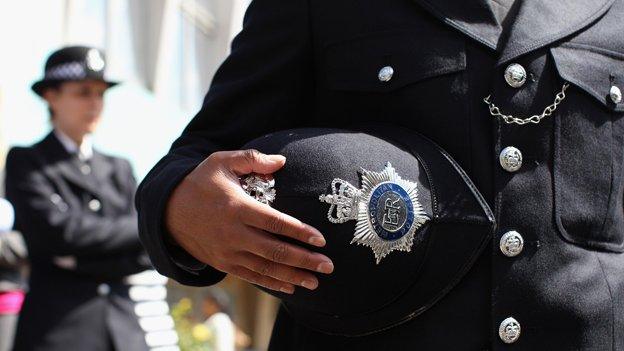
- Published24 April 2014
- Published24 April 2014
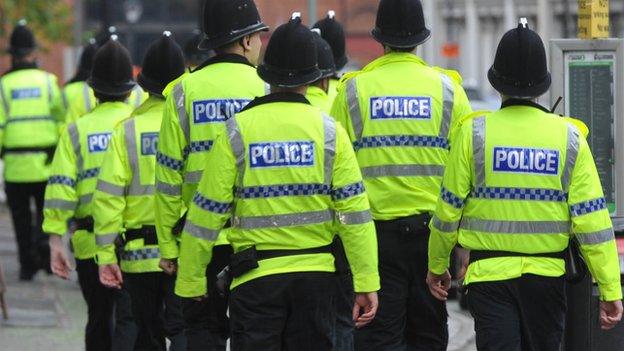
- Published31 March 2014
